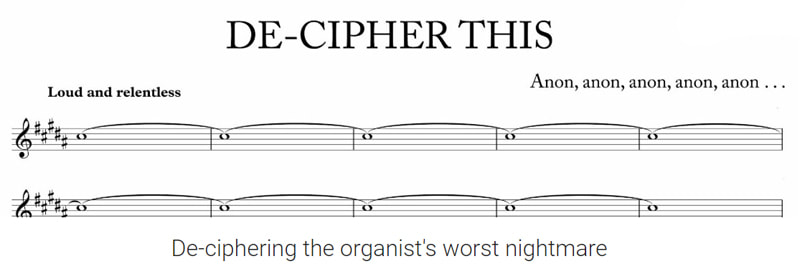Every organist will know about ciphers (for those of you who spell everything the awkward way, cyphers). Ciphers strike fear into your heart and can turn you crazy. Ciphers are so smart they know when to happen, and that is always at the least convenient and most embarrassing time possible.
Ciphers are what happens when a note (or two) in an organ refuse to stop sounding, even when you are no longer playing a note and when the stop is pushed in. The causes can be many and varied, such as objects wedged in the wrong places, sliders sticking from heat or cold. I firmly believe organs are capable of having a cipher for the hell of it.
You can imagine how disastrous this can be. If a single note stubbornly squeals away, what chance does the organist have to play the programme, or the audience to hear the intended piece. In short, all you can do is try removing the offending pipe, stuff a jersey into the speaking pipe mouth to muffle the sound. Or shut off the organ, and crawl away into a corner to die. It really feels that bad.Since you can't beat them, join them, and with that in mind I have created a special design called "How to make an organist happy - de-cipher this!".
The music score shows an eternally sounding single note, and if you look closely at the name of the composer, you will see that it is written by Anon, anon, anon, anon, anon... (Say that out loud and you'll get the idea)
The music score shows an eternally sounding single note, and if you look closely at the name of the composer, you will see that it is written by Anon, anon, anon, anon, anon... (Say that out loud and you'll get the idea)
Click the thumbnails above to see these products or to browse through the collection of many more products (ties, ipad cases, clock, bathmats, cards, bags etc) go here.
Happy de-ciphering!





 RSS Feed
RSS Feed
